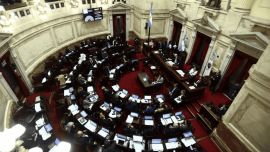When Alberto Fernández began his stint as president, he assumed that his compatriots would judge his performance by the way he handled the country’s broken-down economy. His original game plan was to blame all its many shortcomings on Mauricio Macri (who, he continues to insist, deliberately wrecked it for unspeakably sinister reasons), tell creditors they would have to wait a few years before getting any of their money back and spend more of what was still available on the social welfare handouts a large chunk of the people who voted for him rely on to put food on the table.
Before taking office, he had contrived to persuade himself that filling people’s pockets with freshly-minted money would be sure to make consumption boom and output zoom upwards, thereby solving most of the country's economic and social woes. After all, if they were all Macri’s fault, replacing him with a decent warm-hearted Peronist like himself would be more than enough to make them go away. He also toyed with the idea of adopting the allegedly successful “Portuguese” model until he was told that it would entail slashing public spending, including pensions and the wages of state employees, almost bankrupting universities and ramming through many other harsh “neoliberal” measures under the supervision of beady-eyed technocrats with Germanic accents working for the “troika”: the IMF, The European Central Bank and the European Commission. On hearing this, he decided that the Portuguese approach was not for him.
When Alberto finally realised that the task awaiting him would be a bit more complicated than he had cheerfully imagined, he set about looking for an alternative. To nobody’s surprise, the rethink took time and, while he was at it, things started going awry. As the weeks went by, he attributed his unwillingness to tell us exactly what he had in mind to the alleged need to come to some kind of agreement with the bondholders; once that had been settled, he would stop dithering and get down to business.
But then, just when confidence in the government’s ability to do anything useful was dwindling fast, the coronavirus arrived and, to Alberto’s evident relief, the economy dropped to somewhere near the bottom of his list of priorities. He made this clear by announcing that in his view letting it sink would be a small price to pay if halting most activities helped save lives. Who could disagree? As he and many other politicians elsewhere have kept telling us in case we forget, economies can recover from depressions but the dead remain well and truly dead. This being so, one might argue that it would be a good idea to ban all road traffic because in Argentina about 7,000 people a year are killed in accidents, but while few would go to such a humanitarian extreme, many have taken to pointing out that the cost in lives of a prolonged lockdown is likely to be far higher than whatever the virus would exact if restrictions were relaxed so people could go back to work.
Alberto, who is fond of reminding us that he is a law professor by trade, thinks it is disreputable to worry overmuch about economic matters. He would rather take the Pope’s advice on what to do than pay attention to the warnings of individuals he believes find numbers more interesting than flesh-and-blood human beings. So when the former economy minister Alfonso Prat-Gay pointed out that while lockdowns may succeed in “flattening the curve,” they also “destroy the economy,” he automatically responded by questioning his “moral authority.”
A considerable proportion of Alberto’s fellow politicians are equally reluctant to take economics seriously, as are most academics, intellectuals of one kind and another and much of the general population. Though something like this is true in many other parts of the world, there are few places in which the habit of assuming that economic policy should be left to would-be ethicists is more firmly entrenched than it is in Argentina, which helps explain why the country’s performance in this department has long been so dismal.
Prat-Gay is far from being the only person who suspects that not just his own country’s government but also those of most others have grossly overreacted to the threat posed by the coronavirus. The dire warnings epidemiologists were making a few weeks ago about the hundreds of thousands who would surely die unless strict lockdowns were immediately imposed, have been followed by even more alarming forecasts coming from economists and those politicians who are inclined to listen to them. We are told that the European Union heading towards “a recession of historic proportions,” that the United States, according to Donald Trump, has been hit by something worse than the attacks on Pearl Harbor or the Twin Towers, that the UK “facing its worst slump since the Great Frost of 1709,” and that “famines on a biblical scale” will soon be raging in much of the planet.
It is as though medical specialists and economists were competing to see whose representatives could come up with the most blood-curdling prophecy; after taking an early lead, the doomsday epidemiologists are getting left behind by their rivals who are predicting an incomparably higher body count.
Are any of them right? All the numbers they come up with are speculative. Nobody knows how many people have caught the coronavirus, which makes attempts to estimate the death rate it inflicts mere guesswork, and it is quite impossible to say how many who are still with us would have died had the local government not ordered the police to make most people stay indoors.
Much the same can be said about efforts to calculate the human cost of the depressions, famines, diseases that are left to fester because hospital personnel have been told to concentrate on the latest edition to the host of pathogens waiting out there to put an end to us, and much else that the worldwide lockdowns are bringing in their wake. However, if history is any guide, these side-effects are virtually certain to prove many times more harmful than the virus in its current state. Pandemics are dreadful, but they do less lasting damage than economic depressions even in prosperous and relatively well-organised societies, let alone those getting torn apart by brutal conflicts, as is the case in much of the Middle East, parts of Asia, Africa and, in Latin America, such countries as Venezuela and Nicaragua.






















Comments